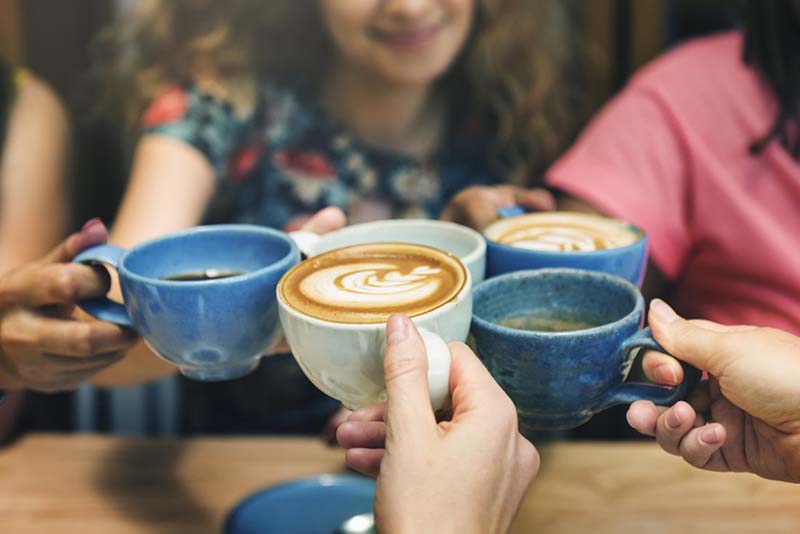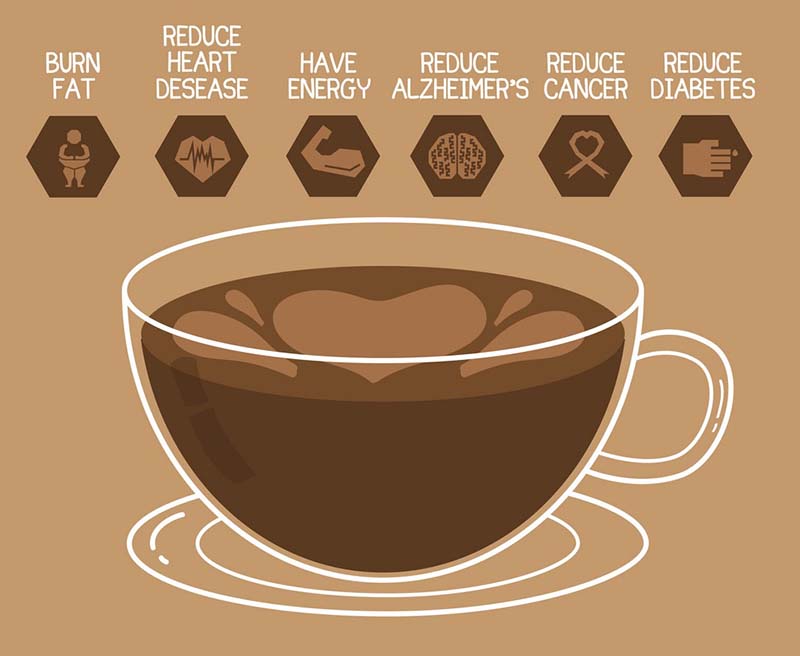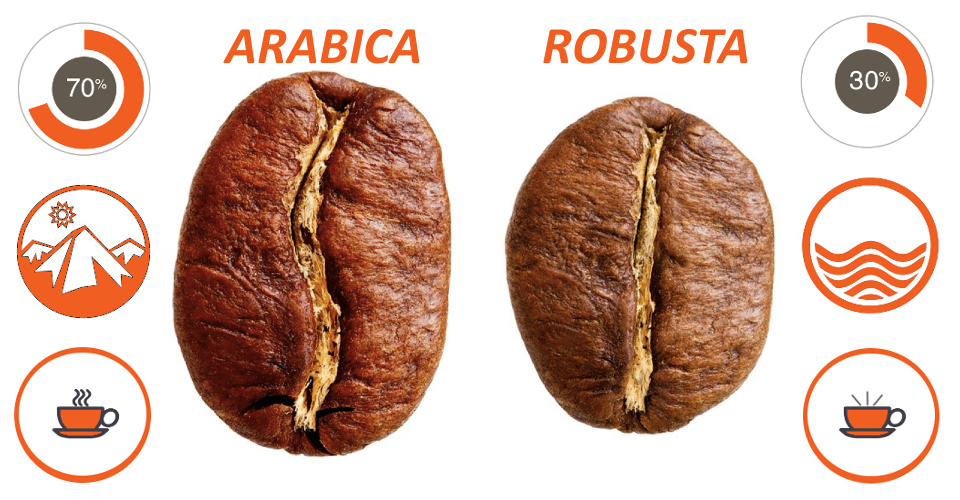Know Unbelievable Health Benefits & Facts About Coffee

Are you one of those people who start their day with a cup of freshly brewed coffee? Have you ever gets crazy just by the aroma of coffee? You are the one who would prefer coffee over any other beverage? Did You travel several miles to have one single cup of coffee? Are you the one who is curious to know every minute details about what’s happening in the world of coffee? And one who cares more about being caffeinated than being hydrated? If you justify and believe in even one statement of coffee than you are definitely a crazy manic of coffee. Today in our blog, we are going to discuss the health benefits and amazing facts of coffee.
Know These Health Benefits Of Coffee:
- The magic of coffee is that apart from tasting amazing, it stimulates the central nervous system to reduce the fatigue and drowsiness.
- According to new research, coffee improves the overall health of a person & also helps in reducing the risk of cancer, Type 2 diabetes, Parkinson, & heart disease.
- Also, it helps in increasing muscular strength, concentration & endurance power, which in turn helps in increasing the lifespan of an individual.

- A meta-analysis from 2017 concluded that people who drank four to six cups of either caffeinated or decaffeinated coffee each day appeared to have a lower risk of metabolic syndrome, including type 2 diabetes.
- A meta-analysis from 2017 concluded that consuming any type of coffee appeared to reduce the risk of nonalcoholic fatty liver disease and cirrhosis.
- Also, in 2019, one famous literature concluded that “coffee intake probably reduces the risk of liver cancer.”
- People who consume coffee may also have a lower risk of gallstone disease.
Also Read: Milk Coffee Vs Black Coffee – Which Is Good For You?
10 Amazing Facts About Coffee
1. Over 2.25 billion cups of coffee are consumed in the world every day. The coffee sales are increasing by 20% per year. Statistics show that among coffee drinkers the average consumption in the US is 3 cups of coffee per day. Around 54% of Americans over the age of 18 drink coffee every day. Americans consume around 400 million cups of coffee per day.
2. Coffee is more effective if you drink it between 9:30 – 11:30 AM. 65% of coffee consumed during breakfast hours, 30% between the meals, and the remaining 5% with other meals.
3. Kopi Luwak is the world’s most expensive coffee. It can cost up to $100 per cup. The main factor of its high price is the uncommon method of producing such a coffee. Produced from the coffee beans which have been digested by a certain Indonesian cat-like animal called then palm civet or civet cat. This is the reason that Kopi Luwak is also called as the cat poop coffee or civet cat coffee. There are some coffee types, which are meant to be more expensive than Kopi Luwak.
These coffees, which prices are labeled at around 500$ per pounds, are:
- Black Ivory Coffee
- Finca El Injerto Coffee
- Hacienda La Esmeralda
4. Do you know which is the world’s most caffeinated country? Finland. According to coffee consumption per capita – Finland comes on the top when it comes to drinking coffee. According to the statistics presented by ICO (International Coffee Organization), an impressive twelve kilos of coffee per person per year is being consumed. Norway, Iceland, Denmark, and Sweden also make to the top 10 coffee drinkers on the list. You’ll be surprised to know that Brazil is ranked 10th in terms of coffee consumption per capita.
Also Read: Coffee & Cholesterol
5. Brazil is the world’s largest producer of coffee, followed by Vietnam and Columbia. In 2016, Brazil produced a staggering 2,595,000 metric tons of coffee beans. In 2017/18 Brazil produced 3.05 metric tons of coffee, which was 30% of the world’s production. Brazil has been the top producer of coffee beans for over 150 years. Stretched over 10,000 square miles on the land of Brazil where some 3,00,000 plantations is done.
6. Coffee has many health benefits and may even help you live longer. Due to its high levels of antioxidants and beneficial nutrients like riboflavin, magnesium and potassium coffee may have health benefits. It helps in boosting the metabolism and reducing the fat. It also helps in lowering the risk of different types of cancer, Type-2 diabetes, Alzheimer’s and heart diseases.
7. There are 100 different types of coffee species, however, these 2 are the main ones that are widely produced and sold – Robusta & Arabica Coffee. About 75% of the world’s coffee production is Arabica, about 25% being Robusta. Brazil is the most significant Arabica producer and Vietnam produces the most Robusta. Robusta beans are much more circular, whereas Arabica is more oval. Robusta has its taste described as burnt tires. The reason that the taste isn’t good for Robusta is that it has more caffeine as compared to Arabica. Robusta bean has 2.7% of caffeine content almost double than 1.5% of Arabica.

8. Decaf isn’t the same as caffeine-free. Decaf is the short form for decaffeinated coffee. It is the coffee made from coffee beans from which almost 97% of the caffeine has been removed. Also, it can be removed by using water, organic solvents, or carbon dioxide (Swiss water process). Decaf coffee has 3 milligrams of caffeine per cup compared to 85 milligrams in a regular cup of coffee – which is a considerable amount if you’re sensitive to caffeine.
9. Caffeine is available in more than 60 plants. It’s not just the coffee beans that contain caffeine, tea leaves, kola nuts (which flavours cola) and cocoa beans contain caffeine. The stimulant is found in leaves, seeds, fruits, and a variety of plants. Caffeine is present in many popular soft drinks.
Also Read: Caffeine Myths And Facts
10. It takes around 45 coffee beans or 18 grams of dry ground coffee to make a typical shot of espresso. The average coffee bush produces less than 1 kg coffee or around 50 cups of espresso in a year. Espresso originated in Italy, brewed by forcing a small amount of nearly boiling water under pressure through finely-ground coffee beans. Espresso is generally thicker than coffee brewed by other methods, has a higher concentration of suspended and dissolved solids, and has crema on the top.









